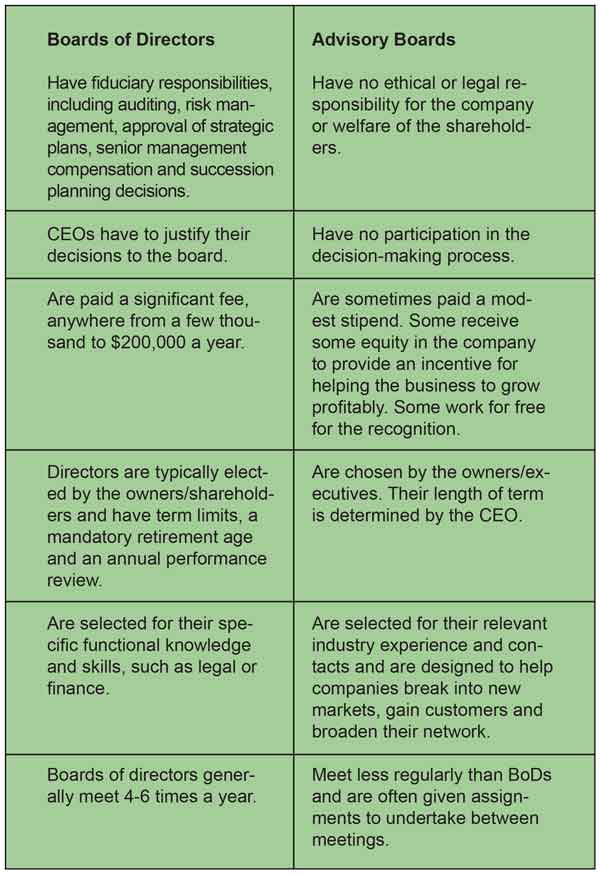 One of the first decisions interested CEOs should make is whether a true fiduciary board of directors is needed or whether an advisory group is better suited.
One of the first decisions interested CEOs should make is whether a true fiduciary board of directors is needed or whether an advisory group is better suited.
A fiduciary board of directors has the responsibility to represent the interest of owners/ shareholders and usually has several roles: auditing of the company’s books, risk management, approval of strategic plans, compensation/succession planning for the senior leaders and performance appraisal of the CEO. They typically have approval power over several of these, which can cause friction with an owner/founder/CEO, who is usually the largest shareholder.
An advisory group does not have the ethical or legal responsibility to look out for the welfare of shareholders. Typically, advisory group members are selected for their specific industry experience and contacts and their ability to open doors and make introductions. Advisory groups usually meet less regularly than boards of directors and often are given assignments to undertake between meetings. Advisory groups are usually paid a modest stipend and sometimes receive some equity in the company to provide an incentive for helping the business grow profitably.
For fiduciary boards, who are typically elected by the owners/shareholders, there should be specific terms, typically one to three years, a mandatory retirement age, and an annual performance review. Great boards usually consist of a majority of outside directors (non-employees) with perhaps one or two inside directors (who are also employees, such as the CEO, CFO). Advisory groups are much less formal and members often serve at the pleasure of the CEO.
For advisory groups, owners/CEOs usually select members themselves. Advisory group members should be selected for their specific, relevant industry experience and contacts. Board of director members are often selected more for their particular functional knowledge and skills. I advise CEOs to select members who complement each other in their skillsets. Selecting experts in sales and marketing, finance and controls, manufacturing, human resources and compensation, business law, accounting, and even having a therapist or mediation expert in the mix, will result in a well-rounded group that is prepared to respond to an array of business challenges.
Chief Executive Group exists to improve the performance of U.S. CEOs, senior executives and public-company directors, helping you grow your companies, build your communities and strengthen society. Learn more at chiefexecutivegroup.com.
0

1:00 - 5:00 pm
Over 70% of Executives Surveyed Agree: Many Strategic Planning Efforts Lack Systematic Approach Tips for Enhancing Your Strategic Planning Process
Executives expressed frustration with their current strategic planning process. Issues include:
Steve Rutan and Denise Harrison have put together an afternoon workshop that will provide the tools you need to address these concerns. They have worked with hundreds of executives to develop a systematic approach that will enable your team to make better decisions during strategic planning. Steve and Denise will walk you through exercises for prioritizing your lists and steps that will reset and reinvigorate your process. This will be a hands-on workshop that will enable you to think about your business as you use the tools that are being presented. If you are ready for a Strategic Planning tune-up, select this workshop in your registration form. The additional fee of $695 will be added to your total.

2:00 - 5:00 pm
Female leaders face the same issues all leaders do, but they often face additional challenges too. In this peer session, we will facilitate a discussion of best practices and how to overcome common barriers to help women leaders be more effective within and outside their organizations.
Limited space available.

10:30 - 5:00 pm
General’s Retreat at Hermitage Golf Course
Sponsored by UBS
General’s Retreat, built in 1986 with architect Gary Roger Baird, has been voted the “Best Golf Course in Nashville” and is a “must play” when visiting the Nashville, Tennessee area. With the beautiful setting along the Cumberland River, golfers of all capabilities will thoroughly enjoy the golf, scenery and hospitality.
The golf outing fee includes transportation to and from the hotel, greens/cart fees, use of practice facilities, and boxed lunch. The bus will leave the hotel at 10:30 am for a noon shotgun start and return to the hotel after the cocktail reception following the completion of the round.